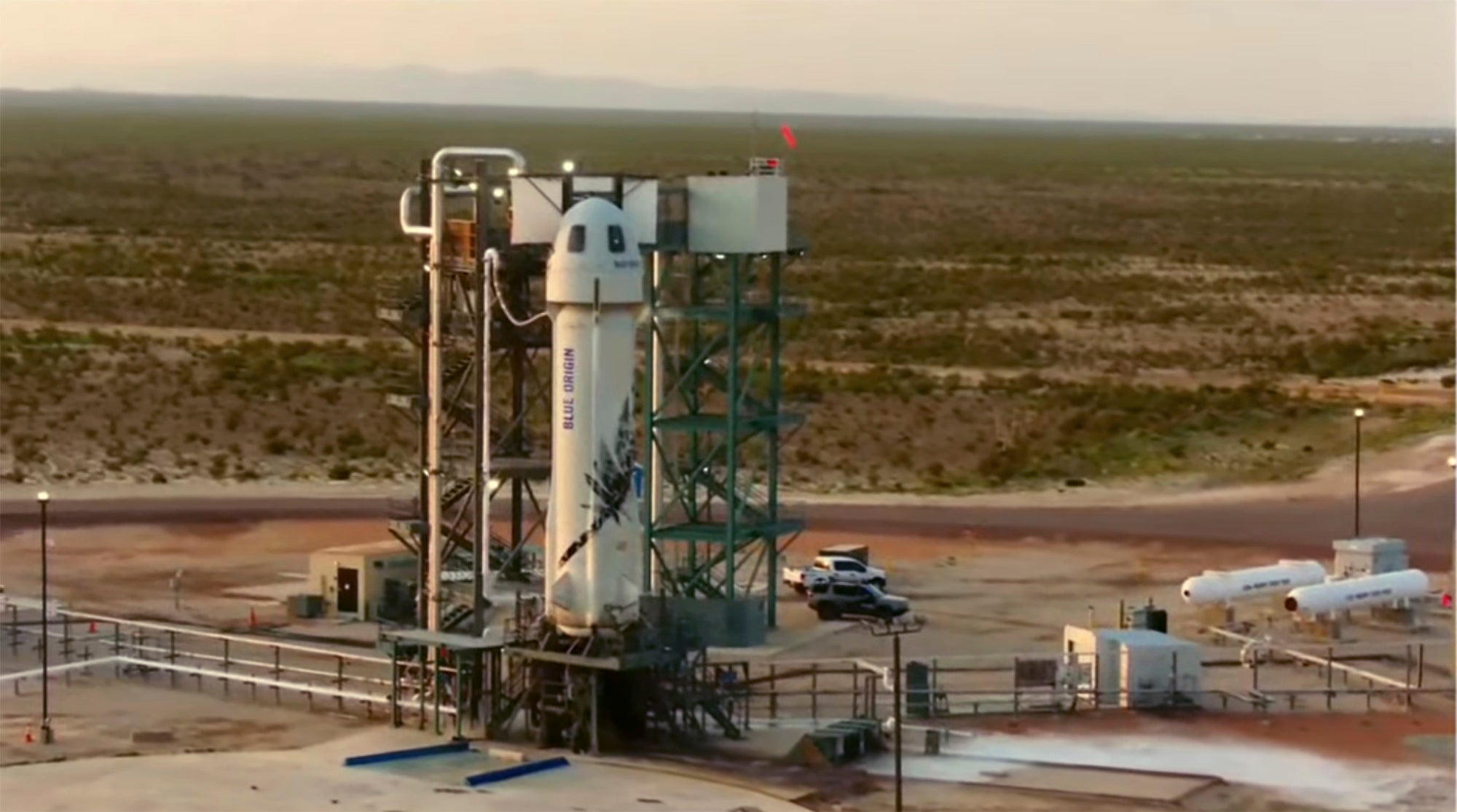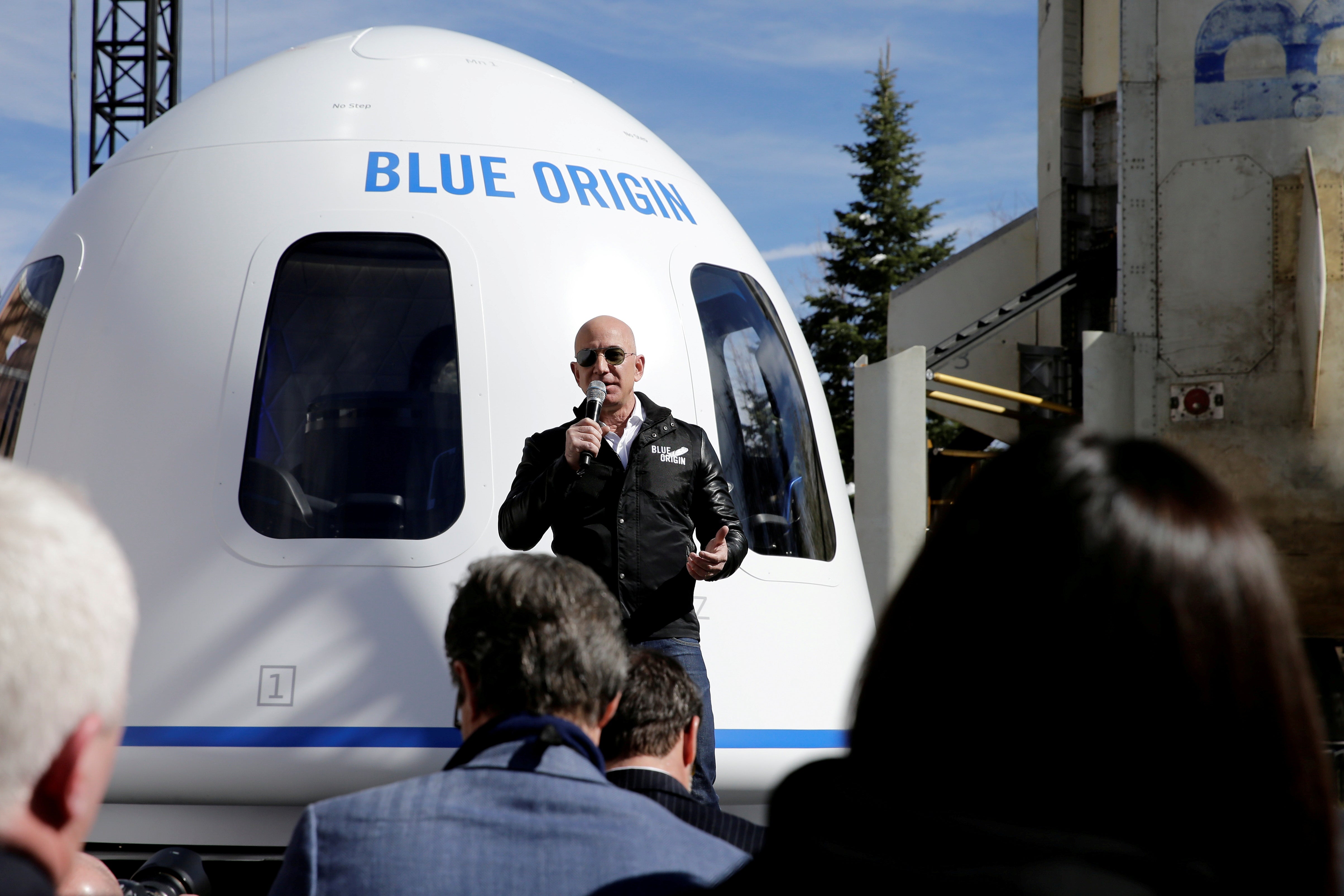Why are billionaires like Jeff Bezos launching themselves into a new space race?
Amazon founder joins Sir Richard Branson and Elon Musk in striving for the stars but many argue their fortunes could be better spent here on Earth
What are they up to?
Amazon founder Jeff Bezos made his maiden voyage into space on Tuesday, taking to the atmosphere aboard a Blue Origin rocket as part of a crew of four, an undertaking he hopes will beckon the dawning of the age of interstellar tourism.
The wealthiest man on Earth blasted off from Van Horn, Texas, in the company of his brother Mark, 18-year-old financier’s son Oliver Daemen of the Netherlands and 82-year-old aviation pioneer Wally Funk, the latter two the youngest and oldest person to ever leave the planet respectively.
Their fully-automated New Shepard craft, which does not require trained personnel to operate, launched on the 52nd anniversary of the Apollo 11 moon landing, hitting an altitude of roughly 66 miles before making its return to terra firma, all inside of 10 minutes.
The launch followed 15 successful test missions by the company since 2015 and realises the dream of a lifetime for Mr Bezos, who hopes to make lucrative commercial flights a reality in the near future.
His exploits also come nine days after Sir Richard Branson’s space travel venture Virgin Galactict took to the skies above New Mexico in its Unity craft (while most of us were glued to the the Euro 2020 final), reaching a height of 55 miles above ground, an achievement Mr Bezos’s camp has rubbished by arguing it fell short of touching the true boundary of space, the Karman Line.
Mr Branson, a showman who has previously kite-surfed the English Channel and attempted to circle the world in a hot air balloon in the manner of Jules Verne’s gentleman adventurer Phileas Fogg, denied he was trying to pip Mr Bezos at the post.
Meanwhile, Tesla boss and cryptocurrency influencer Elon Musk is continuing to develop projects of his own at SpaceX, tweeting regular updates about the progress of his latest Starship prototype, the SN16.
Mr Musk has ambitions to launch crewed missions to Mars as early as 2024 and currently has the field to himself, with no government agency or private competitor on course to challenge his goal of being the first to reach the Red Planet.
Equally unable to resist stealing Mr Bezos’s thunder, SpaceX tweeted an image of the first static test of its new Starlink Heavy Booster (boasting three Raptor engines) in the early hours of Tuesday morning, while its patron was busy wishing his rival good luck.
How are they justifying their projects?
“I know it’s going to change me and I’m excited to find out how,” Mr Bezos told CNN ahead of Tuesday’s take-off.
“We really believe this flight is safe - I had friends say to me, ‘How about the second flight or the third flight, why do you have to go on the first flight?’ and the point is that we know the vehicle’s safe.
“If the vehicle is not safe for me, it’s not safe for anyone. We have never raced. We have taken this one step at a time, we’re ready.”
For Sir Richard, reaching outer space is less to do with personal growth or taking risks and primarily about expanding man’s horizons.
“I truly believe that space belongs to all of us,” he said before the Unity launch, declaring that Virgin Galactic “stands at the vanguard of a new commercial space industry, which is set to open space to humankind and change the world for good”.
He added: “It’s one thing to have a dream of making space more accessible to all; it’s another for an incredible team to collectively turn that dream into reality.

“As part of a remarkable crew of mission specialists, I’m honoured to help validate the journey our future astronauts will undertake and ensure we deliver the unique customer experience people expect from Virgin.”
As for Mr Musk, he has described his motivation as lying in the prospect of our planet facing existential threats, telling a conference in Mexico in 2016 that the future for the human species amounts to staying on Earth and awaiting “some eventual extinction event” unless we establish new colonies elsewhere to increase our chances of survival.
“We need to have a big permanently occupied base on the Moon, and then build a city on Mars and become a spacefaring civilisation,” he told a Nasa conference this April.
“We don’t want to be one of those single planet species, we want to be a multi-planetary species.”
Why are we asking this now?
Planet Earth certainly feels under duress in summer 2021, with recent natural disasters like the “heat dome” boiling the Pacific Northwest, wildfires tearing through the California hills and floods engulfing continental Europe all placing renewed emphasis on the urgent need to address the climate emergency and the consequences of global heating before it is too late.
The coronavirus pandemic continues to rage across the world, with the Tokyo Olympics facing the threat of a last-minute cancellation just days before its opening ceremony as Japanese case numbers soar and the wisdom of Boris Johnson’s “Freedom Day” undermined by the fact that he, his chancellor and his new health secretary all had to meet it in isolation.
We’ve seen economic turmoil, violence in Washington, Northern Ireland, Gaza and South Africa, political authoritarianism thriving and racism erupting on social media as society gives the impression of becoming more bitter, fragmented and unequal with every passing day
Against the backdrop of these multiple crises of late capitalism, the efforts of the super-rich to ascend to the stars and leave our wearying struggles behind might remind you of the ennui and disillusionment of Watchmen’s Dr Manhattan relocating to the Moon in a panel from the celebrated graphic novel so often repurposed as a meme.
Their projects have been called everything from multi-billion dollar exercises in extreme narcissism to a jaw-dropping waste of money better spent on tackling the climate crisis or other serious problems of our moment like entrenched poverty.
Familiar criticisms of Amazon’s corporate tax record and questions over its treatment of its workforce are commonly cited among the derision, but Mr Bezos does at least deserve huge credit for putting aside $10bn of his personal fortune into the Bezos Earth Fund to help safeguard the environment.

When such opposition was put to him by CNN earlier this week, the network pointing out that many people think there are worthier uses for his investment than fanciful space travel, the e-commerce tycoon responded: “Well, I say they’re largely right. We have to do both. We have lots of problems here and now on Earth and we need to work on those.
“And we always need to look to the future. We’ve always done that as a species, as a civilisation. We have to do both.
“If we can do that then we’ll be building a road to space for the next generations to do amazing things there. And those amazing things will solve problems here on Earth,” he said.
“So, the real answer is: Yes, we have to do both.”
Sir Richard Branson was even more forthright in defending his ambitions, telling US chat show host Stephen Colbert that the naysayers “are not fully educated as to what space does for Earth.”
“Every single spaceship that we sent… putting satellites up there, monitoring different things around the world, the degradation of rainforests, monitoring food distribution, even monitoring things like climate change, these things are essential for us back here on Earth.
“We need more spaceships going up to space, we don’t need less.”
Join our commenting forum
Join thought-provoking conversations, follow other Independent readers and see their replies
Comments


Bookmark popover
Removed from bookmarks